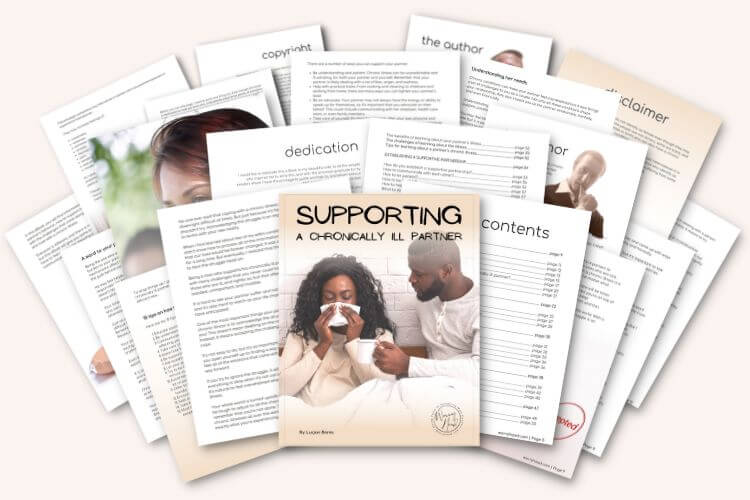Can a chronic illness lead to divorce?
The divorce rates of couples with chronic illnesses are as high as 75 percent. The rate is so high because of the added stress that chronic illness can bring to a marriage. There are ways to reduce the chance of divorce with chronic illness, but before I tell you how, let’s answer the main question – can a chronic illness lead to divorce?
Yes. Here’s why:
Dealing with a chronic illness is very stressful, it leads to a lack of communication, arguments, and resentment. The financial strain of treatments and medications creates tension, and that creates distance, jealousy, lack of intimacy, guilt, anger, anxiety, and depression, which can eventually lead to divorce.
In a nutshell, I answered if a chronic illness can lead to divorce, and the answer was a definite YES, but the question remains – why does a chronic illness lead to divorce?
Why does a chronic illness lead to divorce?
Knowing why does a chronic illness lead to divorce is very important because by knowing the reasons for it you can find a way to prevent it.
My chronically ill wife asked me on at least four occasions to divorce her. She thought I wasn’t happy and felt responsible for the impact her illnesses had on our marriage. This was her reason. But you might have a different situation and your reasons may be different too.
My wife has two chronic illnesses, endometriosis, and fibromyalgia. The endometriosis divorce rate is as high as 75%, similarly, fibromyalgia divorce rate.
Below you will find the 9 most common reasons why this happens. But first, if you want to learn how to cope with your partner’s chronic illness, how to support her struggles, and manage a relationship with a chronic condition, I give away a FREE Chapter of my eBook: “Supporting a Chronically Ill Partner”.
This chapter alone has all the comprehensive information about acknowledging the struggles, including:
- A word to your partner.
- A word to you.
- Stepping on eggshells.
- Understanding her needs.
- How to acknowledge having a chronically ill partner?
- Acknowledging can be hard.
- 15 tips on how to do it!
Get the 1st Chapter FREE!
Chronic Illness for Partners

Stress.
The first reason why a chronic illness leads to divorce is when one or both partners are dealing with a chronic illness, it can be very stressful. The added stress can lead to arguments and conflict, which can eventually lead to divorce.
My wife suffers from two chronic conditions, the first one is deep infiltrating endometriosis, and the second one is fibromyalgia disorder.
Both chronic conditions not only impact my wife physically but also emotionally and mentally.
Her battle with never-ending and reoccurring symptoms made her feel suicidal. She tried to take her own life on a few occasions. It was either due to her anxiety, depression, and even Obsessive-Compulsive Disorder.
Stress is the number one factor that can lead to divorce, but what are the other reasons?
Lack of communication.
Chronic illness can often lead to a lack of communication between partners. This is because the sick partner may feel like they can’t talk about their illness with their spouse, or they may be too tired to communicate properly.
This lack of communication can cause tension and resentment, which can eventually lead to divorce.
I always prioritize communication and even though we went through really hard times, talking with my wife always helped us in the most challenging situations.
Finances.
The financial side of chronic illness affects most couples because dealing with a chronic illness can be very expensive.
The cost of medication, treatments, and doctor’s appointments can add up quickly. This financial stress can put a strain on the marriage, and can eventually lead to divorce.
This is why I started this very blog. It was one of the reasons that I decided to do it apart from spreading awareness about endometriosis and fibromyalgia. Blogging can become your full-time job and help you financially during the most challenging times.
Distance.
When one partner is dealing with a chronic illness, they may start to withdraw from their spouse.
This is because they may feel like they are a burden, or they may be too tired to participate in activities that they used to enjoy. This distance can cause tension and resentment, which can eventually lead to divorce.
My wife asked me to divorce her for the sake of my happiness a few times, but I refused every time. I knew never to make any permanent decisions for temporary emotions.
If your wife feels the same as my M used to, it is probably because of her hormone imbalance as they flare up and cause her to feel anxious or sad. It usually happens around her ovulation and before her period. At least for my wife.
Hormone replacement therapy can be very helpful in these situations. When either of you becomes distanced, try to remember the reasons why you got married in the first place and don’t give up easily.
Lack of intimacy.
Chronic illness can often lead to a lack of intimacy in the marriage. This is because the sick partner may not feel well enough to be intimate with their spouse, or they may be too tired to engage in sexual activity.
This lack of intimacy can definitely cause tension and resentment, which can lead to divorce.
Lack of intimacy can also be caused by medications that the sick partner is taking. For example, your wife may be taking a medication for endometriosis that causes her to have a low sex drive.
Talk to her doctor who may switch to a different medication that doesn’t have that side effect. And remember, a lack of intimacy leads to jealousy…

Jealousy.
Your wife may not feel attractive, which can lead to jealousy. She may feel like her chronic illness has taken away her beauty, and she may be jealous of other women who don’t have to deal with a chronic illness.
If your wife is feeling jealous, try to reassure her that you still find her attractive.
However, not only her might feel that way. If your wife is dealing with a chronic illness, you may start to feel jealous of the attention that she is getting from her doctor, or you may be jealous of the time that she is spending away from you.
This jealousy can cause tension and conflict, and as always, can eventually lead to divorce.
Guilt.
One partner may feel guilty about having a chronic illness, or they may feel guilty about the financial burden that their illness is causing. This guilt can lead to distance and conflict, but guilt is also caused by a lack of communication.
If your wife feels guilty about her chronic illness, try to reassure her that you still love her and that you are willing to help her through this.
You may also feel guilty about not being able to do more to help your wife, or you may feel guilty about the time that you are spending away from her.
Again, communication is key. If you are feeling guilty, talk to your wife about it.
Anger.
Chronic illness can often lead to anger and frustration. The sick wife may be angry at her spouse for not understanding what she is going through, or she may be angry at the world for making her sick in the first place.
My wife often felt frustrated when I repeatedly asked her the same questions. I just wanted to learn but was met with her frustrations and anger.
Sometimes I even felt blamed for something I didn’t know or even wasn’t aware of taking place. So yes, anger can also lead to arguments and conflict, which can eventually lead to divorce.
Depression.
Lastly, a chronic illness can often lead to depression. Your sick wife may start to feel hopeless and helpless, and she may also lose interest in the activities that she used to enjoy. Her depression can lead to distance and conflict.
In my wife’s case, depression led her to suicidal thoughts and self-harm. She harmed herself because she felt like she was a burden to me and our marriage.
If your wife is dealing with depression, it is important to get the help that she needs. Talk to her doctor, and look into therapy or counseling.
Depression is serious, and it can definitely lead to divorce if it is not dealt with.
How to reduce the chance of divorce with chronic illness?
Can a chronic illness lead to divorce? Yes, but you can save your marriage! Here are some tips on how to reduce the chance of divorce with chronic illness:
Spend time together: Even though you may not be able to do everything that you used to do together, it is important to still spend time together. This can be in the form
Communicate: Chronic illness can put a lot of strain on a marriage, but communication is key. If you are feeling angry, frustrated, or depressed, talk to your spouse about it.
Seek help: If you or your spouse is dealing with depression, seek professional help. Therapy can be very beneficial for both individuals and couples.
Be patient: Chronic illness can be unpredictable, so it is important to be patient with each other. There will be good days and bad days, but try to ride out the storm together.
Show support: Showing support for each other is essential. Whether it is simply lending a listening ear or helping out with chores, showing that you are there for each other can make all the difference.
Be intimate: Intimacy is important in any relationship, but it can be especially important for couples dealing with chronic illnesses. Physical touch can help to reduce stress and anxiety, and it can also help to foster a deeper connection.
While chronic illness can put a lot of strain on a marriage, there are ways to reduce the chance of divorce.
Communication, patience, support, and intimacy are all key. If you or your spouse is dealing with a chronic illness, make sure to reach out for help when needed. With the right tools and support, you can weather any storm.
I hope this article helped. If you have any questions or comments, please feel free to leave them below. I wish you all the best!
Get the 1st Chapter FREE!
Chronic Illness for Partners



About Me
Hi, I’m Lucjan! The reason why I decided to create this blog was my beautiful wife, who experienced a lot of pain in life, but also the lack of information about endometriosis and fibromyalgia for men…
